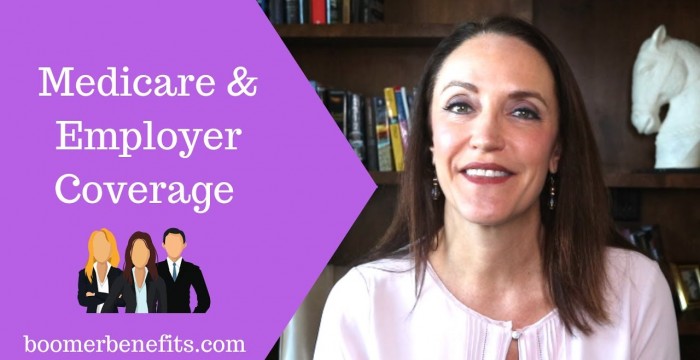We live in an age when people often work well past age 65 in America. This brings up a very important questions about Medicare and Employer coverage. Should you enroll in Medicare at age 65 when you are still working? Do you need both Parts A and B or can you enroll in just Part B?
These are tricky questions because the answers depend on the size of the employer that you are working for.
Medicare is secondary if you age 65 or older and your employer has more than 20 employees and you are still ACTIVELY working (not a retiree or on COBRA). This is called Medicare Secondary Payer. In this scenario, your group plan pays first, and then Medicare pays second. (People under 65 on Medicare, click here for different rules).
Most active employees with group coverage enroll in Part A because it is premium-free if you have worked at least ten years. Part A can coordinate to lower your costs if you have a hospital stay. For example, let’s say your employer health plan has a $3000 deductible. The Medicare Part A hospital deductible is $1364 in 2019. So if you have both your employer insurance and Part A, and you incur a bill for a hospital stay, you will only be out $1364. Medicare pays the rest of any Part A services.
It doesn’t necessarily work the same way with Part B and Part B costs money (see next section), so that’s why most people choose Part A only when working for a large employer.
One exception would be if you are contributing to an HSA account and plan to continue doing so. If that’s the case, do not enroll in Part A.
Now Part B is not premium-free. You will pay a monthly premium for Part B based on your income. Some people eligible for Medicare and employer group health coverage choose to delay enrolling in Medicare Part B and Part D while still covered on their group health coverage (or their spouse’s group health coverage).
This saves them the premiums they would have paid for those parts. Your employer coverage already includes outpatient benefits so it may not be worth it to pay those Part B and D premiums.
When you DO delay Part B, your large group plan is considered creditable coverage. That means that you can enroll in Part B later without late penalty when you decide to retire. Once you quit and leave the group plan, your insurance company will mail you a creditable coverage letter. Be sure you keep this. You will need it to show Medicare that you had other coverage so that you are not subject to late penalties for Parts B and D.
Medicare is primary if you are age 65 or older and your employer has less than 20 employees. You will need both Part A & B for sure because Medicare will pay first, and then your group insurance will pay secondary. Occasionally we see some insurance companies who will cover claims even if you don’t have Part B. Don’t buy it. You run the risk of that insurance company changing that at any time without warning, and leaving you stuck with all the expenses that Part B would normally cover. It’s not worth the risk – we advise always enrolling in Parts A & B if your employer has less than 20 employees and Medicare will be primary.
However, you may be able to delay enrolling in a Part D drug plan without penalty if your group plan has RX benefits, as most do. Be sure to compare costs. It is sometimes cheaper to leave the group insurance altogether and enroll in a Medicare supplement as your secondary instead.
Boomer Benefits provides free claims support for life for all of our Medigap and Medicare Advantage policyholders so that you are never alone in dealing with Medicare.
New to Medicare? Attend our FREE Medicare 101 Webinar:
Get our FREE 6-Day Medicare Video Email course with bonus Medicare cost worksheet:
To learn about Medicare and Employer Coverage:
Get the Do I Need Part B cheat sheet here:
Join our 100,000+ Fans on Facebook:
~~~~~~~~~~~~~~~~~~~~~~~~~~~~~~~~~~~~~~~~~
Subscribe for NEW YouTube Videos! Be sure to hit the bell to be notified whenever we publish them:
~~~~~~~~~~~~~~~~~~~~~~~~~~~~~~~~~~~~~~~~~







Will you be working past age 65? I’d be interested to hear how long you plan to work beyond the standard retirement age.
Yes, I need to work past 65. I can’t legally retire until I am 66. I also have three minor children at home that I still need to provide health care for and a 50-year-old wife who doesn’t work. I was booted out of Obamacare and my employer has such a bad healthcare insurance program that is like having catastrophic coverage only!
+Rich Gonzales oh no! That’s so common these days for employer plans to have high deductibles or be expensive – the coverage just isn’t as good as it used to be. Were your wife and kids able to get on an Obamacare plan for them?
I’m already working past age 65! If I can make it to 70, I’ll work until then. Again, if I get a windfall, I’m outa here!
So for someone like my dad that works for a small non-profit (15 employees), his best bet will be to get enrolled in A&B and his supp while he is working even if he isn’t taking S.S.?
Hi Kelsey, he can enroll in A&B and either use his group insurance as his secondary or he can enroll in a Medicare supplement and a Part D drug plan. He should compare costs for both options and go with whichever one is most cost-effective.
oh thank goodness. I was going to sign up for Medicare at 65, because I thought I had to – good to know I don’t have to.
I’m 67 1/2 and plan to work till I ‘m 70
Thanks for this information!
I’m 64 and plan to work another 5 to 6 years.
Good for you Susie! We have so many people that work into their 70’s these days.
Is it true you can contribute to an HSA after age 65? My accountant says you are not allowed to contribute to your HSA after you become eligible for Medicare at 65 and it does not matter whether you take medicare or not.
Hi Thomas, it’s totally legal to contribute into an HSA if you don’t enroll in Medicare. You just can’t contribute into an HSA if you have any other form of health coverage besides the high deductible health plan that qualifies you to open an HSA. You can delay enrollment into Parts A, B, and D without penalty as long as you have creditable employer health coverage from a larger employer. You can read more here: https://boomerbenefits.com/hsa-and-medicare/
Wow. Great information presented in a digestible way!!!
I’m 65 and hope to continue working until I reach the age of 70.
Good plan, Cathi! Are you at a large employer so that you can delay the expense of Parts B and D for a few years? That makes a world of difference.
+Boomer Benefits Yes, I am!
65 later this year. Working less than 40 hr weeks for another 5+ years. Slowly pulling back.
This is a great strategy Dennis. Did you ask your employer to let you work the fewer hours if you agreed to stay on for the extra years? Super smart as it can let you postpone taking SS income benefits so that you can get the maximum amount when you file
Self-employed! Just doing my thing… : )
You make it so simple. Thank you!
My husband will turn 65 in April but is still working. He’s self-employed so he buys his own health insurance. What would be the best course of action for him?
He is in a group plan with a major insurance company.
Hi Bethany, he should enroll in both parts of Medicare – A and B- and then add either a Medicare supplement or Medicare Advantage plan. Not only will this coverage be considerably cheaper than what he is likely paying now, he’ll have lower deductibles and he’ll also avoid late penalties. If you would like us to walk you through it, don’t hesitate to have him call us at 817-249-8600.
Thank you so much! I showed him your reply and he appreciated. He may give you a call sometime.
still working, intend to work for a few more years.
I’m still working. I’m turning 66 this year. I’m planning on working until I can find a way to afford to retire. So barring a Lottery win, I may work until I drop. (But I’m actively working on that retirement plan. Don’t worry.)
Working for a large employer. At this moment plan to retire later this year at 66.
Danielle, your videos have been very informative and to the point, some of the best I’ve seen. I already called your office and spoke to one of the agents. My comment is lengthy but my mistakes may help others with their decisions.
I turned 65 in December 2018 and for years I planned on retiring just as soon as I was able to get Medicare. About June of 2018 I had started a project at work that I’m enjoying so I decided to stay on for about ten months past my 65th birthday. On December 28, 2018 I applied online for Medicare Part A only since I work for a large company and have medical insurance. I had to go to the local Social Security office to show some documents on Jan 9, 2019. I received my Medicare card about 3 weeks later which showed coverage was retroactive to December 1st, 2018. On the first weekend of this month (February), due to circumstances outside of work, I decided to retire immediately. That’s when I realized that there were unintended consequences to getting Part A. I thought that I could just go online and apply for part B and 3 weeks or so later I’d have it. I called Social Security to find out how to do it properly and was told that the application had to be on paper, and that the earliest that I could get part B is May 1. The cheapest policy I can get to tie coverage between now and then if I were to retire today would be COBRA, at over $1100 per month. My choices now are: 1) pay for Cobra, 2) go without medical coverage for about 3 months (I would only have hospitalization through part A), or 3) continue working until May. Luckily I don’t have an emergency and I like the job so it will be choice number 3. If I had watched this video before I may have delayed getting Part A or would have gotten complete coverage and retired. The other consequence….my company contributes at least $500 to my HSA at the beginning of the year because I have a high deductible policy. However, since I have Part A and can no longer contribute to the HSA so I won’t get that money. I did spend four days in the hospital in December which could have have had a silver lining if Medicare paid for part of my bill but since I had already met my out-of-pocket deductible only the insurance company will benefit. 🙁
Hi there, this story is all too common, and now that you’ve shared this, I think maybe it’s time for a video about how a person’s Initial Enrollment Period trumps a Special Enrollment Period which you could normally use to add Part B within 63 days of leaving employer coverage. We cover this on one of our Medicare enrollment pages on our website because so many people work just a couple months past age 65 and run into exactly this problem. If you enroll in Medicare Part B in the 3 months after your birthday, even if you had employer coverage up until now, you end up with a delayed start date. It’s a silly rule up at Social Security in my opinion as it inconveniences unsuspecting people. I’m so glad that you have an alternative option to stay working! Please now that I am out here preaching the information from every possible place – Facebook, Youtube, our website, personal finance podcasts, guest blogs – trying to get the word out about all these Medicare rules in every possible place. I send you hugs for having to go through this. Hang in there! And many thanks for your story as I’ll now put this issue on my list of videos to be filmed. xo
I’m a new subscriber to your YouTube channel and I’ve really learned a lot! I will be turning 65 this June, but I’m still working, so I plan to enroll in Part A only. However, I’m probably going to go part time starting in 2020 and will have to give up my employer health coverage as it’s a full time employee only benefit. I’m thinking of waiting until the Annual Election Period this coming fall to enroll in Part B and a Medigap plan to begin 1/1/2020. Does that sound right? There’s so much information to learn but your YouTube channel and blog has explained it very well!
Hi MsDeedee, thanks for your feedback on our channel! That means the world to me, truly. Assuming that your employer has more than 20 employees, you can apply for Part B at whatever time that you leave that employer coverage. You will have an 8 month special election period to do so, although most people of course sign up for the Part B to begin the first of the month after their last day of employment so that they have seamless coverage. So yes, you’ll be in good shape and it doesn’t have to be in the Annual Election Period – the AEP is for changing drug plans or Advantage plans. Your Special Election Period for losing employer coverage will give you the only ticket you need to get into Part B.
+Boomer Benefits Thanks for your response! Yes, I work for a large employer. So if I’m understanding this correctly, I don’t have to worry about underwriting on a Medigap plan as long as I enroll within 8 months of going part time, correct? It just so happens to be at the same time as the annual election period, so that’s where my confusion was. Because my husband and I will need for it to begin 1/1/2020, we thought we would choose our plan and enroll later this year. Thanks again for your help.
+MsDeedee1954 – you have 8 months to sign up for Part B, and then from your Part B effective date, you have 6 months to join a Medigap plan without health questions. So when you get closer to the retirement date, feel free to reach out to my team and we’ll walk you through both steps – applying for Part B and submitting the supplement application using your open enrollment for Medigap. Our service is free and we’ll make sure you get everything lined up for 1/1/20. Feel free to shoot me questions here anytime between now and then!
I will be turning 65 soon and work for a very large employer with good health care coverage. I want to continue contributing to my HSA as my employer also contributes and it is tax free. Do I need to reject Medicare Part A or merely do nothing so I am not enrolled? I cant seem to find the answer. Thanks
Hi Pam, if your employer is also contributing, I completely agree that you want to maximize that and continue contributing as long as possible. So do not enroll in ANY part of Medicare, including Part A, and do not enroll in SS income benefits either because that will automatically trigger Part A. You can read more about HSA and Medicare here on our blog post: https://boomerbenefits.com/hsa-and-medicare/
+Boomer Benefits Thanks! So it is my understanding that at this time while I am working, I will do nothing about Medicare and SS since I dont want to receive either at this time. Is that correct??
+Pam Boerner yes that’s correct. Just do not enroll, and you’ll be good to go.
Thank you for this. I have appreciated your information. I will be 69 this month and will be retiring as of 5/31. I just applied for social security and did not realize that Medicare A came with that. I had not been able to find anywhere about when to apply for Medicare if I want it to start on 6/1 to keep my coverage seamless. Reading the answers to the other questions, apparently I can do that as soon as I retire and have it reach backward to my retirement date.
Hi Joanne, you are welcome for the information. Yes many people are unaware of the link between SS and Part A, so sometimes it catches people offguard. You can’t contribute to a health savings account once you are on Part A, but otherwise, it can’t hurt you. And yes whenever you have creditable coverage from a large employer, you can sign up for Medicare just prior to your retirement date and have the coverage pick up the day after you retire. What effective date did they list on your card for Part A?
+Boomer Benefits Hi, I just applied last week so I don’t have anything yet. SocSec has just acknowledged my application, nothing more yet. Thanks!
What about someone on disability. I’m turning 60 and my husband is still working should I take Medicare or stay on his group insurance plan?